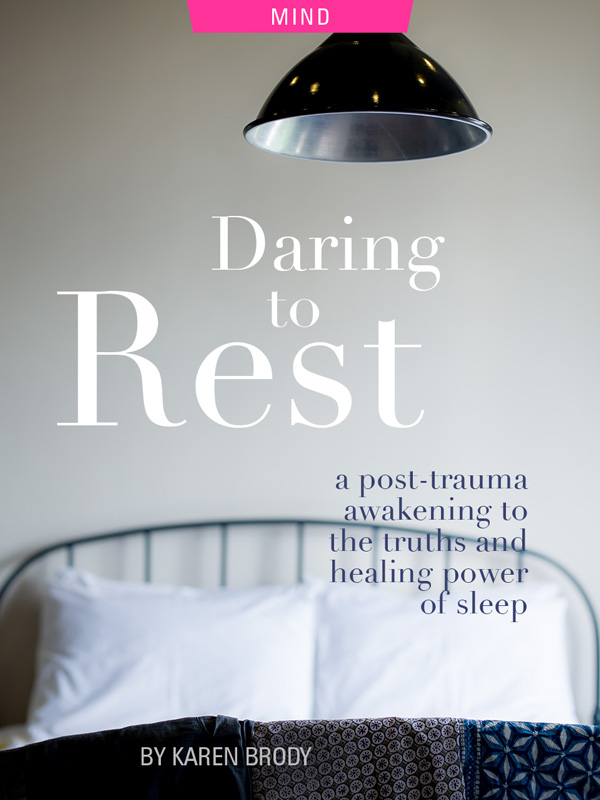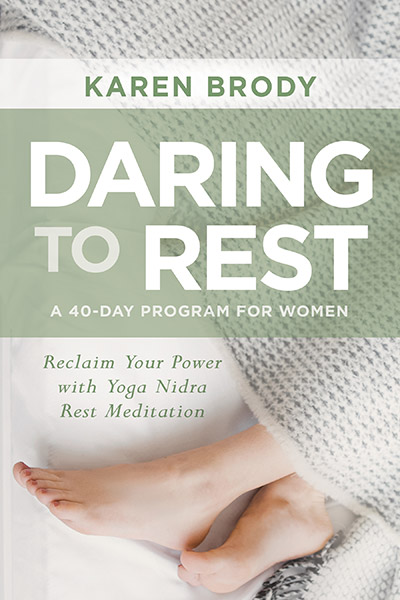
A post-trauma awakening to the truths and healing power of sleep
—
In 2007, my husband and I decided to fulfill a lifelong dream — to live in Africa with our children. My husband resided in Africa during parts of his childhood, and we lived in Kenya together before our children were born. One day not too long after we made this major family decision, my husband received a job offer in Tanzania. A dream come true, we sold everything, said goodbye to family and friends, and embraced this exciting new chapter in our lives.
Our dream life, however, quickly turned into our worst nightmare.
Not long after moving into our new home, we were violently robbed and held at gunpoint by three men. They threatened to kill us and our children, and attempted to force me into the trunk of our car that they planned to use as their getaway vehicle; my husband, thank goodness, was able to convince them to spare me. While our sons slept in their bedrooms, the armed men tied us up with telephone and computer wires. We managed to free ourselves hours later.
After this horrific experience, I filled every minute with something to do. I road myself into exhaustion, coming up with any and every possible reason for me to say no to any form of relaxation, rest, or good sleep.
In actuality, I had stopped getting good sleep right after the robbery. Darkness (the robbery occurred at night) now triggered unreasonable fear, a post-traumatic stress disorder (PTSD) symptom that held my brain and body hostage throughout the night, causing me to feel like I had a hangover most days.
It’s so easy to play the role of victim when we’re exhausted. I played it hard, by proclaiming how busy I was and how the universe most definitely did not have my back.
Victimhood and lack of sleep are like chocolate cake. The more we eat a piece, the more we spiral into eating the whole cake.
I kept eating this chocolate cake, getting no rest at all and feeling sorry for myself until, finally, I had had enough.
I decided to leave my husband and children. Maybe for an hour, maybe forever. All I knew was that I had to get into my minivan and leave. It was two years after the robbery, and I was still paralyzed by fear and felt so alone. All I wanted was for somebody to save me.
So I left the kids with my husband when he returned home from work, and I drove to a local park, three minutes from my house in a raging thunderstorm. At first, I screamed, did the ugly cry, played the victim I clearly was, and used every tissue in the minivan. Nobody loves me, I said to myself. This felt so true, and every bone in my body ached to prove it.
After my meltdown, I sat there for a long time in numbed silence. The fragrant music of nothing. At some point, I leaned back, closed my eyes, and this is when I began to feel different. No thoughts. No solutions. No to-do list. No agenda for what I would do or where I would go next.
In the Art of Lying Down, Bernd Brunner says, “In our culture, lingering in the horizontal is only acceptable for the shortest possible period required to power the next bout of activity.”
Here I was doing the opposite, resting for me. My body was no longer willing to please anyone but myself.
At the end of a very long period of rest in my minivan, all I knew was that I wanted more rest. If there was a place to go for an intravenous drip of deep rest, I was going to head straight there.
How could I not have seen that rest was what I needed? It was in my minivan that day that I remembered a deep rest tool I had learned a few years earlier and loved, but in my victimhood, I had forgot. This powerful rest tool is yoga nidra, a sleep-based guided meditation technique. 45 minutes of yoga nidra can feel like three hours of sleep in your body. I call it “meditation with a cherry on top” because you get all the benefits of meditation and deep sleep.
Before I drove the three minutes back home, I made a decision to start practicing yoga nidra again. My Super Nap. The next day, before the kids returned home from school, I set up a space to rest in a small corner of our basement with a mat, blanket, and pillows for under my knees. I had a million excuses of why I had no time to nap, but this time, I was not making any of them. My body had to stop. It felt like life or death.
I made it 40 consecutive days, and by the end, I felt not only deeply rested—like a more alert human who was more gentle with myself and a nicer mommy — but I also felt something unexpected. There is this moment while taking a yoga nidra nap when you are guided into what in yoga is called the Bliss Body. Daily life often keeps us in busy mode, running from our Bliss Body, so a veil goes up, and this causes us to swing into bliss’ opposite, that shiny victim hat holding misery, depression, and unhappiness.
Yoga nidra is like a high-speed train back to bliss.
Have you ever noticed how everything feels more joyful after really a deep, restorative sleep? Multiply that by millions when you practice a yoga nidra Super Nap, because you are literally consciously guided to the Bliss Body; your thoughts nearly zero, which make you feel like you just soaked in a warm lavender hot tub with candles on a moonlit night in Bali, and this gives rise to what has always been there—bliss.
It’s in bliss where so deeply relaxed, we can hold all the ugly we’ve been served in life, and also see the beauty that exists, as well.
For people who have experienced trauma or feel like a victim of anything in life — a chronic medical issue, divorce, etc—a clean Bliss Body often starts with a feeling that everything will be okay. The moment you can feel this, you are free. Victimhood is over.
It took me 40 days of practicing my Super Nap to rewire to bliss. After that, I was no longer up at night afraid of the dark or experiencing other PTSD-related issues; my skin cleared up, and my hot flashes stopped.
At my core, I knew that everything was going to be okay.
Here are 5 reasons why I encourage you to take a yoga nidra Super Nap:
- Relieves physical exhaustion — Yoga nidra helps balance the nervous system, and this begins to relieve your physical exhaustion, because a balanced nervous system reduces stress on your body. It also helps re-teach the body how to sleep. Each time you enter yoga nidra, you are consciously taken from the waking state to the deep sleep state, and even beyond, to a supremely restorative forth state of consciousness.
- Releases emotional exhaustion — We think lying down is just for when we are tired, but getting deep rest is really a measure of how worthy we feel. Do I feel worthy enough to give myself permission to rest? Am I ready to give up being the victim and stop repeating habits and patterns that do not serve me? Yoga nidra helps rewire our bodies to stop this exhausting pity party.
- Helps you rise up — The deep rest of yoga nidra presents this interesting paradox: you rest with no agenda, but actually by doing so, this points you to your truest self; you now know who you are, and you’re not afraid to rise up into your magnificent self. Well-rested women make great leaders. They get things done and give themselves permission to rest all the way to the top.
- 40 days of rest is powerful — After my 40 days of yoga nidra, I decided to get trained in it, and the first thing I did was to offer a 40-day experience for women. It’s known as the time it takes to break a habit, to experience transformation, but 40 days of rest is also a well-known postpartum practice in Latin America known as the cuarentena. The “quarantine” — a period to do nothing except rest and recover. What if whenever we gave birth to anything — a book, a business, a baby — we gave ourselves 40 days like this? It’s a simple rule of rhythm. After you give out lots of energy, you must then receive it. Rest is the receive.
- Peace within helps create a more peaceful world — There is no doubt in my mind that yoga nidra is a Super Nap that helps you feel deep peace within. We make a mistake thinking that focusing on ourselves is egoistic when, in fact, by cultivating inner peace and truly loving ourselves, we create a more peaceful home and world. Prioritizing your wellbeing has nothing to do with ego. But if you still feel like you can’t give yourself permission to rest, then start by lying down for your kids or world peace. The planet needs more people daring to rest.
A month after the Tanzania robbery a friend of mine, a stage and screen director, tepidly whispered, “I know what happened was tough, but this is great material to share one day.” At the time, sharing this story was the farthest from my mind. But then, as I was writing Daring to Rest, I received a clear “soul whisper” that now is the time to share this story, to help others rise from their rubble. The chapter on bliss is the perfect place for this story because it’s twenty-five days into the Daring to Rest program, the physical exhaustion is lifting and the deeper cleaning of the soul is taking place. This tender moment – when rest is really being felt in our cells, atoms, and bones – is when we begin to open to the best version of ourselves. We need a story to remind us that no matter how much life falls apart, we can rise again.
You can let life defeat you — remain exhausted or defeated by a life circumstance — or you can give yourself permission to lie down, get the kind of rest that reboots all of you, and rise back up, fully powered. This is daring to rest.
You may also enjoy reading Interview: Aviva Romm, M.D. | The New Health Paradigm with Kristen Noel
